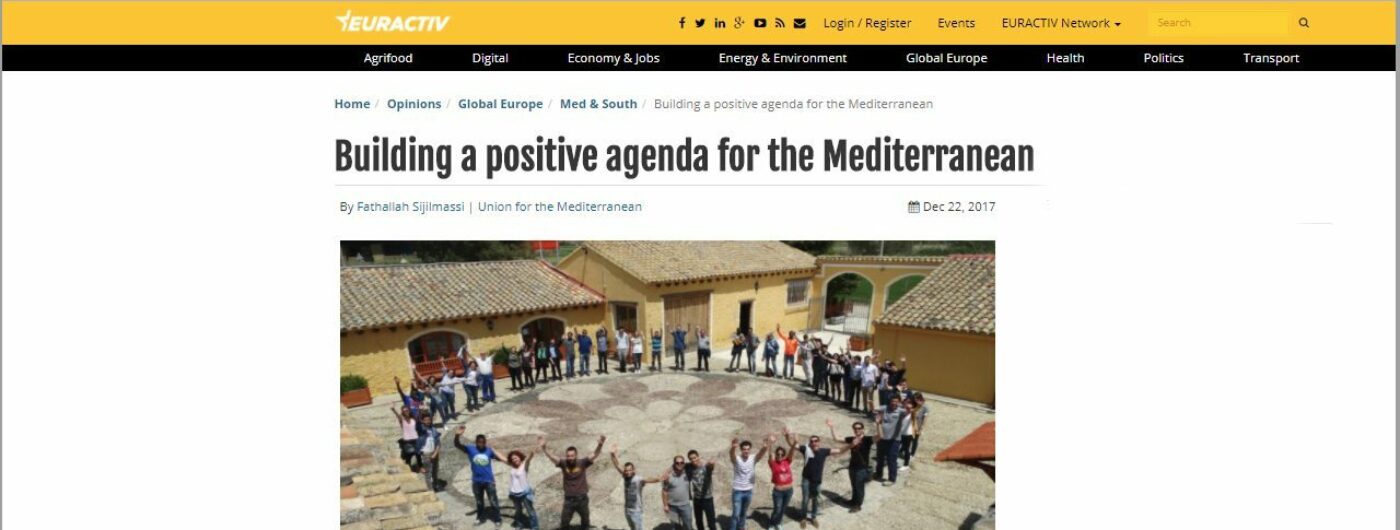
UfM Secretary General, Fathallah Sijilmassi, Tribune on EURACTIV: “Building a positive agenda for the Mediterranean”
22 December 2017.– Today there are three main reasons why we need to mobilise all our efforts to ensure a true partnership between both sides of the Mediterranean.
Firstly, it has never been clearer that the challenges facing the Euro-Mediterranean region call for a collective and concerted response. From security threats to our endeavor of living together to the socio-economic challenges, everything now points to the fact that no response can be solely national or confined to a limited geographical area.
At a time when inward-looking attitudes and nationalist sentiments are on the rise, today we must say loudly and clearly that it is by working together that we will succeed, or else we will all fail.
This is the purpose of the roadmap for the Union for the Mediterranean (UfM), adopted in January 2017 in Barcelona by the foreign affairs ministers from its 43 Member States. It is also in this spirit that the recent African Union – European Union (AU-EU) summit was held in Abidjan. The EU is also in a process of consolidation in view of the need to act collectively in response to the different challenges.
The stability and security of Europe, the Mediterranean and Africa are obviously closely linked.
Secondly, limiting the Southern Mediterranean to the sole task of managing the “negative agenda”, which must of course be firmly and decisively dealt with (terrorism, irregular migration, radicalism, etc.), would be an enormous injustice for the millions of Mediterranean people who are part of the spirit of openness and modernity and whose daily accomplishments are remarkable.
These women and men in the Southern and Northern Mediterranean are the region’s greatest asset and the finest ambassadors for the shared values that we seek to defend and promote. They should be at the centre of our attention and actions.
Thirdly, we must strengthen our collective political engagement to foster concrete actions.
Today the Mediterranean does not need a romantic vision of the glorious past of our sea, “mare nostrum”, a defeatist, anxiety-inducing conversation about the state of the region, or constant theories about the eternal need to restructure the partnership.
The institutions already exist. We must make greater use of them. The funding already exists. We must ensure that it is used fully and effectively for actions that strengthen the bonds between people and bring tangible results which meet their expectations.
It is on the basis of these three observations that the Union for the Mediterranean gives priority to action on the ground rather than to media headlines.
Under the direction of its two Co-Presidencies – the European Union and Jordan – and the action taken by its Secretariat, the activities of the UfM have enabled it to achieve three major strategic objectives in a challenging context in recent years:
- To become a platform for regional political dialogue;
- To bring together governments and regional cooperation actors (international organisations, NGOs, the private sector, local authorities, etc.); and
- To promote specific regional projects for the benefit of people.
The UfM embodies today the will to have a working framework for strengthening the regional cooperation in the Mediterranean. This framework addresses all the serious and unfortunately growing challenges of our region. It also allows us to do so with a global and balanced perspective that fully recognises the existence of important opportunities and addresses the root causes of the current problems we face, such as the challenges of youth employment, education, health, and justice.
From concrete projects for young people – the Euro-Mediterranean University of Fez, the Mediterranean Initiative for Jobs (Med4Jobs), the Sciences Po’s WOMED women’s leadership project, to name but a few – to sustainable development programmes in the areas of water, the environment, the blue economy, transport, urban development, energy and climate change, the opportunities are real and numerous.
Confidently building a positive agenda for the Mediterranean is critical, and it must be done with strength and conviction.

